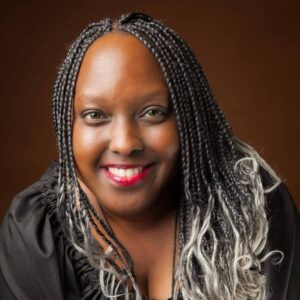Black Heritage in Horror: Interview with Nicole Givens Kurtz

Nicole Givens Kurtz, Publisher. Educator. Author. Mom. Nicole loves reading, writing, and anime. She enjoys reading works that promote women of color and futuristic settings. She also loves a good mystery. She started Mocha Memoirs Press to provide more diversity in speculative fiction. She’s also a scribbler of tales. She’s the recipient of the Ladies of Horror Grant (2021), the Horror Writers Association’s Diversity Grant (2020) and the Atomacon Palmetto Scribe Award-Best Short Story 2021. She’s been named as one of Book Riot’s 6 Best Black Indie SFF Writers and editor of Slay: Stories of the Vampire Noire.
What inspired you to start writing?
I inspired to write after I wrote my first scary story in 10th grade. It involved a Thanksgiving dinner gone horribly wrong. I fell in love with the horror genre when I was 4. Where the Wild Things Are was the first horror book I read, and it remains one of my favorites to this day. I graduated to King in elementary school along with Poe and then to others later in life like Shirley Jackson, L.A. Banks, and Tananarive Due. My favorite authors are Stephen King, Shirley Jackson, Octavia Butler, and Robert B. Parker
What was it about the horror genre that drew you to it?
Horror allows me to indulge my righteous anger without repercussions from society. In horror, I can be free to do and engage in the nightmares, hope, and wrath that are often missing in every day or frowned upon. Horror is freedom.
Do you make a conscious effort to include African diaspora characters and themes in your writing and if so, what do you want to portray?
It isn’t always a conscious effort to include characters from the African diaspora, but because I am African American most of my protagonists are. The first person I write for is me, and I want to see myself reflected in stories.
What has writing horror taught you about the world and yourself?
Writing horror teaches me that Scooby-doo and the gang had it right. The real terrors are human beings and for much of my horror writing, this remains true. As an African American, I do not fear ghosts and zombies as much as I do man. Horror allows me to express myself in an unrestrained way and to delve into those darker parts of myself for examination. I grow through horror writing.
How have you seen the horror genre change over the years? And how do you think it will continue to evolve?
Over the last few years, since the success of Lovecraft Country, there have been a handful of Black horror works from major streaming channels, which is good to see. The genre has been a bit more open with its work towards acknowledging new and diverse voices in the genre. HWA has been working hard on this and not only applying lip-service a genuine effort, which I would love to see continue as we move forward.
How do you feel the Black community has been represented thus far in the genre and what hopes do you have for representation in the genre going forward?
There’s progress in terms of representation. Linda Addison had worked extremely hard in paving the way but also reaching back. As I mentioned in the previous answer, HWA has done work to pry open the door wider for diverse voices but there’s so much more work to be done.
Who are some of your favorite Black characters in horror?
As problematic as she is, Susannah Dean from a href=” https://stephenking.com/” target=”new”>Stephen King’sDark Tower series is a favorite. I also like Damali Richards of L.A. Banks’Vampire Huntress series.
Who are some African diaspora horror authors you recommend our audience check out?
Sumiko Saulson, L. Marie Wood, Alledria Hurt:, LH Moore, Rhonda Jackson Garcia, John Lawson, Marc Abbott, Steven Van Patten, Craig Laurance Gidney, Michelle Lane
What is one piece of advice you would give horror authors today?
Persevere and network. Networking helps you persevere.
And to the Black writers out there who are just getting started, what advice would you give them?
Your story matters and is important, so tell it like you want to tell it, regardless if people say it isn’t, well, especially if people say it isn’t.



